11 Things “The Ten Commandments” Movie Got Wrong
Growing up in secular America, it was always a major event when they would broadcast The Ten Commandments on one of the major, primetime networks. Although I watched it on a television screen decades after it “played on the big screen, it still took my breath away – even as a child of the eighties, who grew up accustomed to Spielberg and Lucas-era spectacle.
My first go-around actually learning the Torah with Rashi’s commentary didn’t happen until my early twenties, and I was struck by how much of my own, personal experience of the Exodus was based more on the 10 Commandments than actual Jewish tradition. Comparing and contrasting the two has made for some excellent Shabbos table discussions and intellectual excercises over the years.
Here are just a fraction of the differences between the film and the traditional, text-based Jewish version of the Exodus:
1) We Are Family In both The Ten Commandments and The Prince of Egypt, Moshe does not grow up knowing his birth family and only later discovers he was, in fact, a Hebrew. In the Torah account of the story, although Moshe was taken from the Nile by Batya and lived in Pharoah’s house, he continued to maintain a relationship with his birth family – even nursing from his birth mother. Which segues nicely to our next difference:
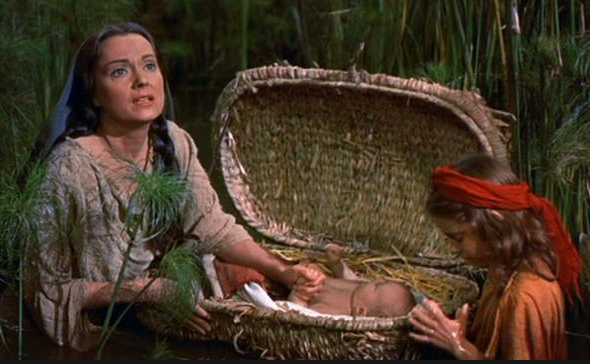 2) Moses’ Mother’s Name: The film calls her Yoshebel, which only shares the same first syllable as Yocheved, the name she’s called in the Torah. The name Yocheved means “God’s Glory,” while Yoshebel is made up.
2) Moses’ Mother’s Name: The film calls her Yoshebel, which only shares the same first syllable as Yocheved, the name she’s called in the Torah. The name Yocheved means “God’s Glory,” while Yoshebel is made up.
3) Moses’ Oratory Skills: Unlike Charlton Heston, a classically-trained, masterful orator, the Torah says that Moshe had a severe speech impediment, and had to relay all of his messages through his brother, Aaron.
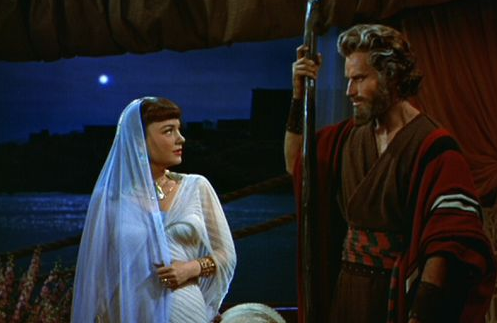 4) Moses’ Egyptian girlfriend (or lack there of): Although the film gives Moses an Egyptian girlfriend named Nefertari who appears throughout the story, she does not appear in the Chumash (or any other parts of the Torah) at all. In the Torah, Moshe gets married to Tzipporah, a Giyores whom he saves by a well. Her father Yisro (Jethro) eventually converts as well, becoming the model for a righteous convert.
4) Moses’ Egyptian girlfriend (or lack there of): Although the film gives Moses an Egyptian girlfriend named Nefertari who appears throughout the story, she does not appear in the Chumash (or any other parts of the Torah) at all. In the Torah, Moshe gets married to Tzipporah, a Giyores whom he saves by a well. Her father Yisro (Jethro) eventually converts as well, becoming the model for a righteous convert.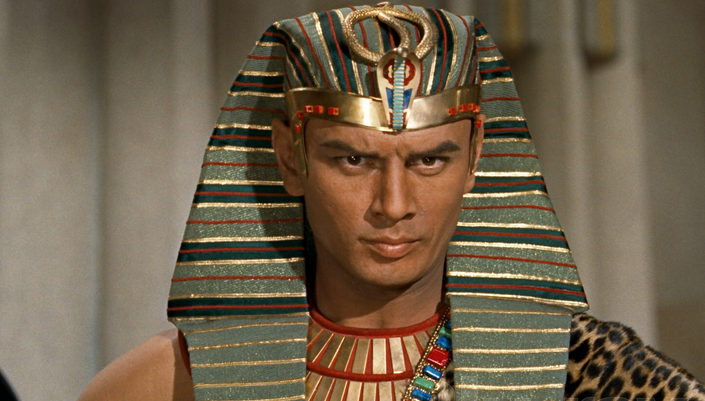 6) Pharoah’s Name: The Chumash only refers to them both the first and second as “Pharoah,” never giving their names. The film calls both of them Ramses.
6) Pharoah’s Name: The Chumash only refers to them both the first and second as “Pharoah,” never giving their names. The film calls both of them Ramses. 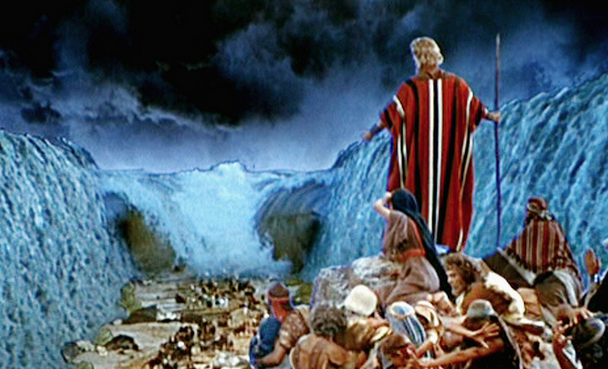 7) Where is Nachshon?!: The Midrash goes into great detail about the Splitting of the Sea, particularly the story of Nachshon the son of Aminadav – who followed Moshe’s orders and walked into the sea until the waters covered his nostrils. Only then, following the footsoldier’s self-sacrifice, did the sea finally split – into 12 COLUMNS!!! Bummer that hasn’t made that into any film of the story (yet).
7) Where is Nachshon?!: The Midrash goes into great detail about the Splitting of the Sea, particularly the story of Nachshon the son of Aminadav – who followed Moshe’s orders and walked into the sea until the waters covered his nostrils. Only then, following the footsoldier’s self-sacrifice, did the sea finally split – into 12 COLUMNS!!! Bummer that hasn’t made that into any film of the story (yet).
8) Where Were The Flowers? The midrash tells us that the foot of Mount Sinai, where the Jews awaited receiving the Torah, was carpeted with greenery and fragrant flowers.
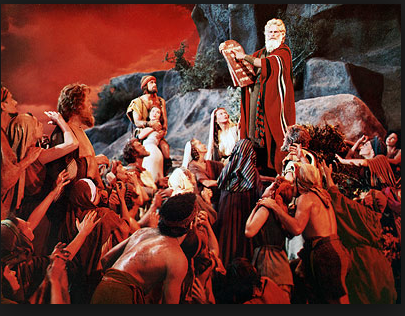
9) Seeing Thunder? The Torah tells us “All the people saw the thunder and lightning.” Visual thunder is so other-worldly, that even
Cecile B. DeMille was not able to recreate such a phenomenon in his film. But it would have been cool if he tried!
10) Rays of Light: When Moses descended Mount Sinai, coming so close to the Almighty changed his face forever. It shone so bright, the Torah says he had to wear a veil from that point forward.
11) Dealing with the Golden Calf: While the film shows Moses shattering the Tablets in anger upon witnessing the Golden Calf, the Torah’s account has Moshe “tearing up the contract” of the first set of tablets, and returning to the mountaintop for another forty-days to negotiate repentance and atonement on behalf of the Jewish people.
Despite the movie’s nearly 4 hour length, there is a very good reason why we dedicate 2 entire nights a year to retell this story, despite what Cecil B. DeMille tried to do in one shot. The greatest part of the greatest story ever told, is the fact that we keep telling it, year after year, with our own imaginations to do the acting, directing and editing.
If you found this content meaningful and want to help further our mission through our Keter, Makom, and Tikun branches, please consider becoming a Change Maker today.







6 comments
Sort by
That was not a mouse. Before the water turned red (to blood), a piece of a costume decoration bounced along the altar from left to screen right.
I’ve been watching Ten Commandments since I was a child in Catholic grade school. As an adult, I’ve always wondered about the accuracy and obvious holes in the story such as the triangle between Moses, Rameses, and Neffetiri who wasn’t a real person. Also creepy. Rameses and Neffetiri had to be related. Seti treated her like a daughter or a favored niece. Also interesting, how you refer to Moses as Moshe.
His name in the Torah is Moshe.
Although only men were allowed to be Pharoah, but the succession passed through females. Thus, the surest way for man to establish his claim to the throne was to marry his sister. I have always assumed that Ramses and Nefertiri were brother and sister and that Moses was presumed to be related because of Bithia’s deception as to his origins.
Yes, I was wondering the same thing about Nefertari. I found : Although Nefertari’s family background is unknown, the discovery in her tomb of a knob inscribed with the cartouche of Pharaoh Ay has led people to speculate she was related to him.[12] The time between the reign of Ay and Ramesses II means that Nefertari could possibly not have been a daughter of Ay, though she could have had all her children in her early to mid-30s, and, if any relation exists at all, she would be a great-granddaughter. There is no conclusive evidence linking Nefertari to the royal family of the 18th Dynasty, however.[13] Nefertari married Ramesses II before he ascended the throne.
Very interesting article. I’ve been watching this every year since Last Century. 🙂
Having just rewatched it here in 2022 I wanted to mention two nitpicks:
5) Moses killing the Egyptian: This reminds me of parts of Dune, the power of a special word(s).
9) Seeing Thunder? – During the casting of the Tablet down upon the Golden Calf scene, there were indeed added Lightening going on, horizontally in fact.
Despite my critical reply, I enjoyed your article.